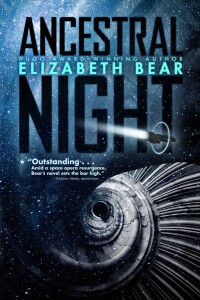 Elizabeth Bear is one of our favorite and most reviewed authors here at GMR, so I’m a little chagrined to admit that Ancestral Night is the first book of hers that I’ve read. It’s also the first ebook that I’ve reviewed, so, welcome to the 21st century, Gary. Also, welcome to … whatever “century” this White Space series takes place in. She doesn’t tell us, just has one character mention in passing that it’s been centuries since humanity first leapt off the homeworld – and I think that’s great. I certainly hope that centuries from now, whether we’re traveling through interstellar space or still hunkered down here in Sol System, we’re not arbitrarily dating things from the supposed birth of some supposed prophet whose followers started a cult after his death.
Elizabeth Bear is one of our favorite and most reviewed authors here at GMR, so I’m a little chagrined to admit that Ancestral Night is the first book of hers that I’ve read. It’s also the first ebook that I’ve reviewed, so, welcome to the 21st century, Gary. Also, welcome to … whatever “century” this White Space series takes place in. She doesn’t tell us, just has one character mention in passing that it’s been centuries since humanity first leapt off the homeworld – and I think that’s great. I certainly hope that centuries from now, whether we’re traveling through interstellar space or still hunkered down here in Sol System, we’re not arbitrarily dating things from the supposed birth of some supposed prophet whose followers started a cult after his death.
Anyway, that’s pretty far afield of the matter at hand, which is this first entry in Bear’s new (as of 2019) White Space series. I love a good space opera and Ancestral Night is a very good one. Bear mentions both C.J. Cherryh and Iain Banks in her Acknowledgments, and I definitely see traces of both those space opera forbears in this book’s themes and accoutrements.
Ancestral Night is the tale of Haimey Dz, a nominally lesbian engineer on a little salvage tug whose ship mind is named Singer and which is piloted by her friend Connla Kurucz. Both Haimey and Connla live nearly full time in zero gravity, so of course their bodies have been modified in many ways, including replacing their feet with “aft hands.” The three of them make their living in the vastness of interstellar space by going to the rips in spacetime caused by unsuccessful transfers out of white space back into Newtonian space, and salvaging the wrecks they find there … if there’s anything left or worth salvaging. White space is Bear’s construct by which the members (“systers”) of the Synarche defy the limits of light speed and flit about the Milky Way galaxy and even beyond it. Their ships look like they’re wearing hula hoops, girdled by rings that generate the white space effect of … folding spacetime around the ship somehow.
On this salvage run, they’re way out in one of the far arms of the galaxy investigating an anomaly that turns out to be a highly valuable artifact as well as a horrendous crime scene. They’re almost immediately attacked by someone, probably pirates who also seem to be interested in the artifact. And, needless to say, adventures ensue.
As those adventures unfold – and they take Haimey, Connla and Singer clear to the galactic core and then way back out into the outer reaches – we learn about the history and ongoing politics of this Synarche and its relations with the pirates, and meet members of many other syster species, etc. And as the story is told in first person by Haimey, we slowly learn about the horrific traumas in Haimey’s past, and live through her experiences as she bravely confronts them over the course of the book. Bear is quite good at weaving all of this explication into the action, and at creating a character in Haimey who has depth and personality.
I appreciate it when an SF author at least tries to deal with elementary astrophyics, and Bear does that quite well, I think. Here’s a passage when they’re coming in out of “white space” to an inhabited system and station: “Nothing in space is ever really standing still, so all vectors and accelerations are, not to put too fine a point on it, relative. Our goal wasn’t so much to slow down, exactly, because a station in orbit around a primary is whipping along at a pretty good pace, depending on the season, the ellipticality of the orbit, and the size of the star and the station’s distance from it. Also on whether it’s parked in a Lagrangian point, or in a secondary orbit around a world or satellite …”
We spend a great deal more time inside Haimey’s head as she grapples with her past and the lies she has believed about it, and tries to come to terms with who she is and is not. It sometimes felt like these internal struggles went on for longer than necessary. But on the other hand, it’s also commendable that Bear doesn’t give an unrealistic picture of the difficulty of “doing the work” necessary to confront one’s demons.
So Ancestral Night is a riveting space opera, but it’s also a deep dive into deep ideas about internal space as well. Bear imparts valuable lessons about humanity, compassion and what it means to be a good person both in relation to one’s own ideals and as part of a community.
(Gallery / Saga Press, 2019)
